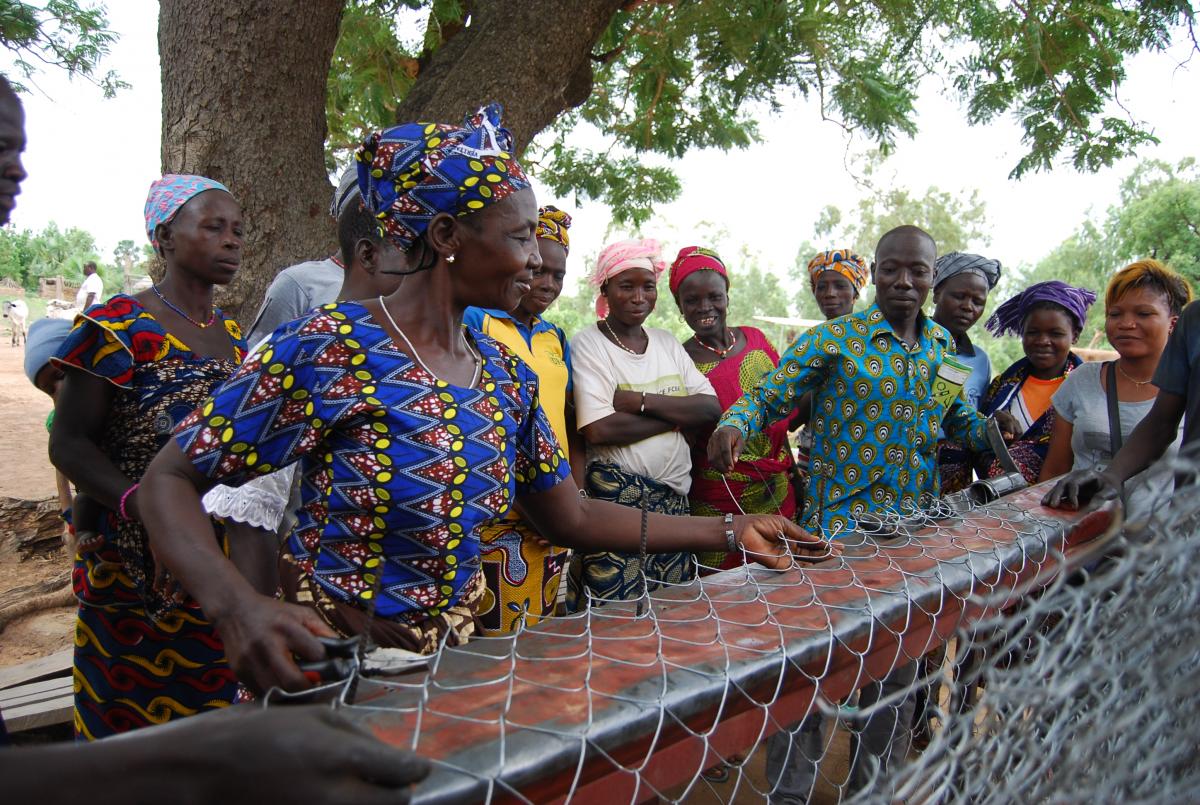Rechercher
Affichage de 2205 à 2220 sur 3114 actualités
-
Amélioration de la sécurité alimentaire et nutritionnelle: Un Pari gagné pour Enabel, Croix Rouge de Belgique, Île de Paix, Louvain Coopération et Pro
Reece-hermine ADANWENON | 10/04/2020
Au Bénin, la pauvreté touche 43% des ménages au niveau national et constitue la première cause d’insécurité alimentaire. Cette dernière a pour origine : le faible niveau d’éducation des chefs des ménages, les mauvaises pratiques d’alimentation et de nutrition, une agriculture de subsistance peu diversifiée, l’augmentation du prix d’achat des denrées alimentaires et le non-respect des règles d’hygiène. Selon l’Analyse Globale de la Vulnérabilité et de la Sécurité Alimentaire (AGVSA) réalisée par le Programme Alimentaire Mondial (PAM) en 2014, au Bénin, 1,1 million de personnes sont en insécurité alimentaire, représentant 11 % des ménages. La situation est plus critique dans certaines communes où l’insécurité alimentaire touche plus d’un quart de la population. C’est le cas du département de l’Atacora avec 25% des ménages en insécurité alimentaire. Dans le but d’améliorer la sécurité alimentaire et nutritionnelle dans les 65 villages cibles, des communes de Boukombé, Cobly, Matéri et Tanguiéta, situées dans le département de l’Atacora, Enabel en complémentarité avec 4 autres partenaires Belges ; Croix Rouge de Belgique, Île de Paix, Louvain Coopération et Protos met en œuvre depuis janvier 2016, le Programme d’Appui Multisectoriel à la Sécurité Alimentaire et Nutritionnelle dans l’Atacora (AMSANA). Cette complémentarité d’acteurs permet de mutualiser les expertises spécifiques et ainsi d’intervenir sur les 4 piliers de la SAN (DANS - Disponibilité, Accessibilité, Nutrition et Stabilité). En effet, dans ces communes, l’alimentation et les revenus des ménages dépendent principalement des activités agricoles de la saison des pluies mais aussi des activités de transformation de produits agricoles par les femmes et des revenus complémentaires de travaux saisonniers effectués hors de la région. Les cultures vivrières traditionnelles qui permettent d’atténuer la période de soudure ont été progressivement abandonnées en faveur de la production de coton qui a un impact négatif sur la fertilité du sol et n’est pas toujours rentable pour les producteurs. De plus, la production de maïs bien qu’en hausse ne permet pas d’accroître la sécurité alimentaire notamment à cause du phénomène de bradage et des pertes post-récolte. Grâce aux différentes approches conduites par le consortium Enabel, Croix Rouge de Belgique, Île de Paix, Louvain Coopération et Protos, plus de 10 000 ménages vulnérables ont amélioré leur situation alimentaire et nutritionnelle. Ceci se traduit entre autres, par (1) l’amélioration de la disponibilité des produits maraîchers et vivriers, (2) l’augmentation et la diversification des revenus des producteurs disposant de services économiques, (3) l’adoption par les communautés de meilleures pratiques nutritionnelles et d’hygiène, (4) une meilleure prise en compte des stratégies et interventions d’appui relatives à la sécurité alimentaire et à la prévention de la malnutrition au niveau communal, départemental et national.Des éléments de succès importants « Il y a 03 années en arrière, nous faisions du maraîchage et étions confrontées à un problème de divagation des animaux qui détruisaient toutes nos cultures. Grâce à l’accompagnement du partenaire, nous avons pu sécuriser notre site avec des grillages en fer, que nous avons nous mêmes tissé. Nous avions également un problème d’eau. Pendant la saison sèche nous avons d’énormes difficultés pour arroser nos plants. Grâce au partenaire, nous avons pu creuser des puits et avons de l’eau à notre disposition toute l’année. Dans nos maisons, depuis que nous sommes accompagnées par AMSANA, nos assiettes sont mieux remplies. Nous utilisons nos produits de maraîchage pour améliorer nos repas. Nous avons dans nos assiettes des légumes et des fruits que nous cultivons nous-mêmes. Ensuite nous pouvons commercialiser le reste de la production et cela nous permet d’avoir un peu d’argent pour subvenir aux besoins de nos enfants (scolarité, soins de santé et habillement) », témoigne Odile UNTUWA KOUAN-KOUAN GOU, présidente de l’Association des femmes maraîchères de Boukombé. Depuis 2016 Enabel, en tant qu’institution de coordination du programme AMSANA, œuvre à promouvoir les synergies d’actions sur le terrain avec pour objectif la réduction de la faim et l’amélioration de la diversification alimentaire des ménages. Ainsi, après 04 ans d’intervention, les changements observés sont importants pour les ménages accompagnés sur différentes thématiques (maraîchage, maïs, fonio, amélioration des revenus, conseils nutritionnels, accès à l’eau potable mais aussi intégration maraîchage pisciculture et gestion des déchets solides ménagers). Au niveau des cultures maraîchères et du maïs, par exemple, les techniques de production agro écologiques sont maîtrisées. Aujourd’hui, l’assolement des sites maraîchers est de plus en plus efficace pour améliorer la diversification alimentaire des ménages, grâce à une importante diversification aussi bien des spéculations traditionnelles (crincrin, gombo, etc.) qu’exotique (carotte, choux, etc.) sans oublier l’association des fruitiers (papayes, bananes, agrumes) et dans certains cas, l’introduction de la pisciculture.Selon Jacques CHABBERT, Coordinateur Enabel/AMSANA, en plus de cet assolement cohérent, aujourd’hui l’ensemble des sites maraîchers d’AMSANA bénéficient de clôtures métalliques produites localement. Cela permet de commencer beaucoup plus tôt la mise en culture, mais aussi de mieux protéger les produits maraîchers en saison sèche. Durant 04 ans d’intervention, aux côtés des ménages bénéficiaires, des milliers de personnes ont changé, de façon irréversible, leur manière de faire. Ce changement n’a pu se réaliser que grâce à l’implication de l’ensemble des équipes des structures d’intervention, qui sont passées du statut ponctuel d’agent de développement au statut durable d’acteurs de changements. Des chiffres et des faits… Enabel : La sécurité alimentaire et nutritionnelle améliorée En totale synergie avec les partenaires impliqués dans le maraîchage (Iles de Paix, Protos et Croix rouge), on compte sur l’ensemble des 4 communes pas moins de 20 sites maraîchers et 8 écoles qui ont intégré la pisciculture à leurs activités maraîchères. En complément de ces approches « collectives » 47 bacs hors sol « individuels » ont aussi été mis à disposition des ménages, pour qu’ils pratiquent la pisciculture à l’échelle familiale. La dynamique de la Croix-Rouge pour les conseils nutritionnels, à travers les groupes communautaires, a fondamentalement changé les pratiques nutritionnelles et d’assainissement du cadre de vie des communautés. Les Micro-Projets, portés par Louvain Coopération, ont amélioré le niveau de revenus des ménages, ce qui leur permet de consacrer plus de moyens à l’alimentation sans négliger pour autant les charges liées à l’éducation et à la santé. Croix Rouge : Des pratiques d’hygiène et nutritionnelles améliorées En termes d’hygiène et d’assainissement que ce soit pour le lavage des mains ou la construction de latrines, d’importants changements ont été observés. Dans le village de Tchawassaka par exemple, la défécation à l’air libre est presque éliminée : il y a au moins une latrine par ménage. Aujourd’hui 96% des enfants se lavent systématiquement les mains avant les repas, contre 5% au début du projet. Les enfants étant une courroie de transmission entre l’école et la communauté, des jardins potagers à but pédagogique ont été mis en place dans 32 écoles. Aujourd’hui, 85% de ces enfants répliquent au niveau de leur maison les pratiques apprises à l’école (production de pépinière et itinéraires techniques de plusieurs spéculations par exemple). D’un point de vue général, les taux de malnutrition aigüe modérée (MAM) et sévère (MAS) ont considérablement baissé. La MAM qui était à 5% et la MAS à 3% en début de projet sont respectivement passé à 1.23% et 0.90%, fin 2019. Îles de Paix : Des légumes de contre-saison, du maïs disponible et des revenus améliorés L’utilisation de méthodes agro écologiques (lutte biologique, compost, etc.) pour les productions maraîchères et du maïs est aujourd’hui devenue une pratique courante pour les producteurs. De plus en plus de ménages répliquent au niveau de leurs maisons les techniques apprises sur les sites maraîchers. Cela permet d’améliorer leur alimentation et leur revenu. Le nombre de maraîchers qui ont produit en contre-saison en 2019 est de 681 contre 600 prévus. La technique de compostage promue a totalement été adoptée par les producteurs, surtout par les femmes. L’écart de rendement entre les personnes accompagnées par le projet et les personnes non accompagnées est de 78%. Les formateurs endogènes formés par le projet, ont accompagné à leur tour les producteurs sur les techniques de conservation (séchage et tri au champ par exemple). Deux types de stockage ont été introduits pour améliorer la conservation des productions ; les Greniers Traditionnels Améliorés (GTA) et les sacs PICS tout deux rapidement adoptés par les communautés comme moyen de stockage. A l’heure actuelle 569 GTA ont été répliqués et 975 sacs PICS acquis par les ménages contre respectivement 120 et 400 prévus. Louvain Coopération : Les ménages améliorent leurs revenus à travers les activités liées au fonio, maraîchage, maïs, élevage et les transformations Au niveau de la transformation du fonio, il y a une nette amélioration en termes de décorticage, aussi bien en milieu rural qu’urbain. En milieu rural, l’amélioration est liée aux bonnes conditions de pilage. En milieu urbain, l’amélioration est liée à l’acquisition, l’installation et la formation à l’utilisation de machines de décorticage. Aujourd’hui, la transformation de fonio atteint les 12 tonnes par an, contre 4 tonnes en début de projet. La certification de la qualité microbiologique des produits, obtenue de la DANA il y a de cela 2 ans, a contribué à l’atteinte de ce résultat pour les deux unités urbaines situées dans la ville de Boukombé. De manière générale, la production et la promotion du fonio sont de belles réussites.. Aujourd’hui, le prix de vente du Kg de fonio Paddy est passé d’environ 350 FCFA en 2015 à 550 FCFA en 2019. A l’état actuel, les communautés gagnent de l’argent grâce aux Micro-Projets initiés. Pour l’ensemble des promoteurs financés, leurs revenus se sont accrus de 47% en moyenne entre 2018 et 2019 que ce soit pour la production du maïs, le maraîchage, l’élevage et la transformation.Protos : Une dynamique pour une meilleure valorisation de l’eau Au total 9 sites de production maraîchère ont été aménagés, avec une maîtrise améliorée de l’eau, permettant à 370 producteurs correspondant à 297 ménages de réaliser leur production sur près de 18,25 ha. Quant à l’eau potable, le programme a beaucoup amélioré sa disponibilité à travers la réalisation de 13 nouveaux forages et la réhabilitation de 9 forages d’eau potable essentiellement répartis dans les communes de Boukombé et Cobly. Aujourd’hui les Associations de Consommateurs d’Eau Potable (ACEP) accompagnées par le programme, sont reconnues par les structures compétentes en tant qu’actrice majeure de la veille citoyenne et participent à la prise de décisions sur la qualité des services publics de l’eau. Un travail d’appropriation au niveau des communes sur le volet eau potable a également été constaté. Certaines communes se sont dotées d’agents supplémentaires sur fonds propres pour assurer l’intermédiation sociale dans le secteur. En plus de cela, plusieurs révisions de la tarification de l’eau ont été faites et adoptées par les conseils communaux. Des perspectives pour l’après projet Il est naturellement regrettable que le programme prenne fin aussitôt, alors que d’importantes et significatives dynamiques de changement sont en cours sur le terrain. Cependant, les approches mises en œuvre par les institutions Belges et leurs partenaires Béninois, reposent sur la mobilisation d’acteurs locaux qui ont bénéficié d’importants renforcements de compétence et qui resteront des acteurs durables de changement. Dans le cadre de la stratégie de sortie, l’ensemble des structures d’intervention facilite l’appropriation des dynamiques de changement aussi bien par les acteurs institutionnels que sont les services déconcentrés de l’Etat, mais aussi les collectivités décentralisées afin qu’ils assurent, après la clôture du programme, les facilitations nécessaires pour continuer d’améliorer le niveau de sécurité alimentaire et nutritionnelle des ménages de l’Atacora. « Actuellement, il faut reconnaître que grâce aux dynamiques mises en œuvre de nombreux messages sont « digérés » par les populations et les acteurs qui les accompagnent. Ils ne réfléchissent plus sur les concepts et approches à mettre en œuvre mais sont immédiatement dans l’action », a rassuré Jacques CHABBERT, Coordinateur Enabel/AMSANA.LE MOT DES MAIRES Richard NAMBIME, Maire de Boukombé"Je veux que Boukombé soit une commune pilote pour la production de grillage car ce que nous y faisons c’est du jamais vu dans la zone. L’accompagnement des communes pour créer le poste de PF-SAN est un point très fort qui témoigne de l’internalisation dont a fait preuve le programme AMSANA. C’est une aubaine pour notre commune d’avoir eu, du début à la fin du programme, une personne référente à la Mairie pour traiter les questions de sécurité alimentaire et nutritionnelle".Théophile NEKOUA, Maire de Cobly"La production de légumes pendant la saison sèche va nous permettre de diminuer notre approvisionnement en légumes qui se faisait essentiellement à Tanguiéta. Il y a quelques jours, j’ai même dit aux maraîchers de Datori que bientôt ils pourront vendre leurs produits au Togo voisin." Paul SAHGUI, Maire de Tanguiéta "Le programme AMSANA nous a vraiment permis d’être des acteurs du changement dans notre commune. Le projet Déchets Solides Ménagers (DSM) nous a permis d’avoir des poubelles installées dans presque tous les ménages et une grande partie des hôtels. Aujourd’hui la ville de Tanguiéta est propre et c’est grâce à l’accompagnement d’Enabel sur le projet DSM."Sorikoua SAMBIENI, Maire de Matéri"Le développement n’est pas uniquement une question d’infrastructures, mais plutôt un système permettant à chacun de s’auto-suffire et de se réaliser. Il faut permettre aux gens d’avoir d’abord le minimum, notamment pour se nourrir afin que si l’on réalise une infrastructure ils puissent l’utiliser. Avec la clôture du programme AMSANA, nous négocions actuellement avec d’autres bailleurs de fonds pour l’aménagement des bas-fonds pour le maraîchage et la pisciculture, cela va nous permettre de disposer de plus de légumes et de protéines dans nos plats".
-

Appui au renforcement de l’écosystème de l’économie numérique au Bénin (DigiBoost)
Reece-hermine ADANWENON | 08/04/2020
Le projet DigiBoost-Bénin financé par l’Union Européenne s'inscrit dans le cadre du programme pour la compétitivité en Afrique de l’Ouest sur le 11e FED (2014-2020) dont l’objectif général vise à renforcer la compétitivité de la région avec un accent particulier sur le renforcement des chaines de valeur et filières prioritaires définies au niveau des pays. Pour le Bénin, ce projet propose un appui budgétaire pour renforcer l’écosystème de l’économie numérique et dispose d’un budget indicatif de 2,8 millions d’Euros.Ambitions et Objectif du Projet « DigiBoost »L’intervention a pour ambition de soutenir le secteur du numérique au Bénin. L’objectif est de renforcer et de consolider l’écosystème à travers des appuis aux structures d’accompagnement des startups (incubateurs, accélérateurs, fab labs, espaces de co-working, …) ainsi qu’aux relations entre les acteurs au sein et en dehors de l’écosystème béninois. Pour atteindre cet objectif et, in fine, appuyer la performance des startups numériques au Bénin, trois domaines de changement complémentaires ont été identifiés : 1. Travailler sur l’amélioration de la capacité et de la performance des structures d’accompagnement (incubateurs et accélérateurs). Ce premier pilier pourrait couvrir de nouvelles infrastructures, des équipements, la gamme complète des Business Development Services (BDS) aux startups numériques mais aussi potentiellement un appui à l’accès aux financements. 2. Améliorer la fréquence et la qualité des relations entre les acteurs de l’écosystème 3.0 au Bénin. 3. Améliorer des éléments clés de l’environnement des affaires du numérique au Bénin, notamment l’appui à l’identification et à la structuration des acteurs du numérique.Bénéficiaires de l’Action et zone d’intervention Les bénéficiaires directs du projet sont structurés en plusieurs types de structures d’accompagnement:Les services d’incubation : incluent l’accompagnement (hébergement, conseil, formation, financement) des porteurs d’idées dans la création d’un modèle entrepreneurial lors des premières étapes de la vie d’une entreprise. · Les services d’accélération : services d'accompagnement de la croissance d’entreprise. Ces services répondent aux besoins spécifiques des jeunes entreprises en croissance (aide à l’accès au financement, consolidation des business modèles et plans, aide à l’expansion des activités dans les nouveaux marchés). · Les services de co-working : espaces de travail ou de bureaux partagés regroupant deux notions: un espace de travail partagé, mais aussi un réseau de travailleurs encourageant l'échange et l'ouverture. Les services de prototypage (Fablabs et Maker Spaces) : services d’accompagnement des startups et des entrepreneurs dans la création de prototypes afin qu’ils puissent tester leurs produits ou services en milieu réel. Les bénéficiaires indirects sont: Les startups dans l’économie numérique. Plus qu’une catégorie d’entreprises, le terme « startup » désigne un état temporaire qui est intrinsèquement lié à l’innovation et l’économie numérique et couvre à la fois des porteurs d’idées et des jeunes entreprises. · Les autres acteurs de l’écosystème : Tous les autres acteurs de l’écosystème numérique (partenaires institutionnels, chambres de commerce, entreprises privées, opérateurs téléphoniques, banques, universités et centres de recherche.
-

Transition Agro-Ecologique par la Recherche Agricole (TAERA)
Reece-hermine ADANWENON | 08/04/2020
L’agriculture est le moteur de l’économie du Bénin et occupe la majorité de la population du pays. Elle repose sur l’agriculture familiale, qui peine à satisfaire une population urbaine croissante et en demande de produits de qualité constante. Le manque de compétitivité des exploitations agricoles familiales ne leur permet pas de répondre à l’évolution des besoins et des marchés, de plus en plus ouverts et dynamiques. Le changement climatique induit une plus grande variabilité des pluies et le développement de pathologies, qui rendent aléatoires la réussite des cultures. La pression sur les ressources naturelles a atteint ses limites, avec un risque de tarissement des puits ou de salinisation des eaux. Le changement climatique renforce les problèmes liés à la perte de la fertilité des sols. Pour faire face aux enjeux environnementaux et satisfaire les besoins des populations en termes de sécurité alimentaire et nutritionnelle, il sera nécessaire de développer des technologies mieux adaptées aux contextes locaux, durables, résilientes aux changements climatiques et socialement viables. Ambitions du Programme : « TAERA »L’Initiative de l’Union Européenne intitulée « Development Smart Innovation through Research in Agriculture (DeSIRA) » vise à stimuler les innovations dans le secteur de l'agriculture et les systèmes de transformation alimentaire. Enabel a été retenu pour sa mise en œuvre au Bénin à travers le Programme Transition Agro-Ecologique par la Recherche Agricole (TAERA) avec les objectifs et résultats suivants.La stratégie opérationnelle De façon opérationnelle l’intervention travaille sur : Les systèmes de production spécifiques du Sud Bénin, confrontés à de forts enjeux en matière de sécurité alimentaire et de gestion des ressources naturelles : La Recherche Action Participative pour aider les populations et les chercheurs multidisciplinaires dans l’identification de problématiques, la recherche de solutions et l’action collective. Les aspects socio-économiques et de mise en marché avec un accent de prise en compte des contraintes sociaux et économiques parfois des innovations.Processus de diffusion des innovations. La transition agro-écologique de l’agriculture implique des changements au niveau des exploitations agricoles, mais également à d’autres niveaux en aval et en amont des chaînes de valeur.
-

Promouvoir les corps de métiers portuaires auprès des femmes
Reece-hermine ADANWENON | 08/04/2020
Dans le but de Promouvoir les corps de métiers portuaires auprès des femmes, Enabel à travers son projet PASPort a donné la parole à des femmes exerçant dans le milieu portuaire. En effet, au Port Autonome de Cotonou, seulement 10% du personnel est féminin. Sur 487 agents, 49 sont des femmes. Au nombre des femmes rencontrées figure Pascaline ADJOFOGUE, première femme capitaine des remorqueurs à être formée au Port d’Anvers dans l’équipage du Bénin grâce au partenariat Bénino-Belge. Pour cette jeune femme de 25 ans, son genre ne constitue pas une barrière. Elle a partagé avec nous son histoire de vie inspirante. Nous avons également rencontré Mireille HEHOMEY Epouse KASSAVI, agent en poste à la Direction Générale du Port Autonome de Cotonou, qui s’est entretenue avec nous sur la lutte des femmes pour leurs droits. Elle a invité les femmes à croire en elles, à briser les barrières professionnelles, à sortir de leur zone de confort, à s’affirmer et à oser.
-

Près de 500 femmes dépistées gratuitement au cancer du col de l’utérus, dà l'hypertension artérielle (HTA) et au diabète.
Reece-hermine ADANWENON | 08/04/2020
Une campagne de dépistage gratuit du Cancer du col de l’Utérus, de l’Hypertension Artérielle et du Diabète a été organisée du 06 au 07 mars dans les communes de Sô-Ava et de Ouidah, situés dans le département de l’Atlantique et à Klouékanmè dans le département du Couffo. Du 09 au 13 mars, ladite campagne a été poursuivie dans les ministères de la Santé, de la Fonction Publique et des Affaires Sociales. Près de 500 femmes âgées de 25 à 65 ans ont été dépistées gratuitement du Cancer du Col de l’utérus, de l'Hypertension Artérielle (HTA) et du Diabète. Initiée par Enabel au Bénin à travers son Programme d'Appui à la Santé Sexuelle et Reproductive et à l'Information Sanitaire P@SRIS, cette campagne a également permis de sensibiliser de nombreuses femmes des zones d’intervention du programme sur les moyens de prévention contre ces différentes maladies qui déciment la gente féminine.
-
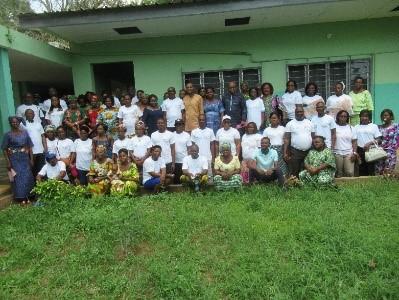
Promouvoir et développer les activités des femmes intervenant dans la filière ananas
Reece-hermine ADANWENON | 08/04/2020
Du 05 au 13 mars 2020, les projets/programmes initiés par Enabel au Bénin ont célébré chacun à leur manière la Journée Internationale de la Femme avec pour thème de célébration : Génération Egalité : Levons-nous pour les droits des femmes ! L’égalité des genres et l’autonomisation des femmes constituent une priorité pour Enabel à travers sa stratégie genre #WeforHer et son Plan d’entreprise 2020. Le lundi 09 mars, le personnel féminin de l’Agence Territoriale de Développement Agricole (ATDA7) et de DEFIA avec des femmes de la filière ananas, ont parcouru les rues de la Commune d’Abomey-Calavi. Au cours de cette caravane qui a mobilisé environ une centaine de personnes (hommes et femmes), les participants ont distribué des affiches, brandis des messages d’appel de lutte pour les droits des femmes. Cette marche qui s’est achevée dans les locaux de l’ATDA a été suivie d’un atelier d’échanges et de réflexions sur des thématiques liées au genre et à l’égalité. A la suite des échanges, onze (11) propositions d’actions ont été faites pour la promotion et le développement des activités des femmes intervenant dans la filière ananas. Parmi toutes les actions proposées, les femmes ont identifié trois (03) qui seront soumises conjointement au Directeur Général de l’ATDA7 et la Manager de DEFIA. Il s’agit de : i) appui aux femmes productrices pour l’accès au film plastique biodégradable ; ii) facilitation de l’accès aux crédits pour les femmes (producteurs, transformatrices, exportatrices et commerçantes d’ananas à des taux d’intérêts bonifiés à un chiffre (5%) avec un appui de fonds de garantie ; iii) appui à la mise aux normes des infrastructures et équipements des femmes transformatrices en priorité pour celles concernées par les subventions en cours. De même, DEFIA a appuyé les femmes membres de la Coopérative des Entreprises de Transformation d’Ananas du Bénin (CETRAB) pour l’organisation d’un atelier de réflexions qui a eu lieu, le 08 mars 2020 à la salle de réunion de GERME à Allada. Cette rencontre d’échange et de partage a enregistré la participation de 70 personnes dont 35 femmes. Trois (03) communications ont été développées: - L’inégalité du genre, de la naissance à l’âge adulte présentée par M Alidou M. Awelou. Elle a permis de mettre en exergue les formes d’inégalités que subissent les femmes depuis leur enfance. Un accent particulier a été mis sur la nécessité pour les femmes de quitter leur zone de confort et de révéler leur talent en prenant exemple sur des femmes leaders qui ont réussi à émerger. - Le leadership féminin présenté par Madame Bertille G. Marcos, Directrice de l’Usine de transformation du jus d’Ananas « les Fruits TILOU ». La communicatrice a expliqué de long en large les qualités que doivent avoir une femme de grande vision. Il s’agit notamment des qualités de femme battante, travailleuse et forte. - La santé sexuelle et reproductive des adolescents et jeunes. Cette communication a permis d’éveiller la conscience des participants sur le rôle des parents dans l’éducation des filles, futures mères. Par ailleurs, l’Union du personnel féminin (UPF) du Ministère de l’Agriculture, de l’Elevage et de la Pêche (MAEP) a organisé avec l’appui de DEFIA, une rencontre des femmes et une mini-foire sur les produits agricoles, du 10 au 13 mars 2020 à Cotonou. Cette foire a connu la participation de quatre (04) transformatrices d’ananas membres de la Fédération Nationale des Coopératives de Transformateurs d’Ananas du Bénin (FENACOTAB). Cette participation a permis de mettre en valeur le potentiel des femmes dans la valorisation des produits agricoles, de faire la promotion de l’ananas et de ses produits transformés.
-
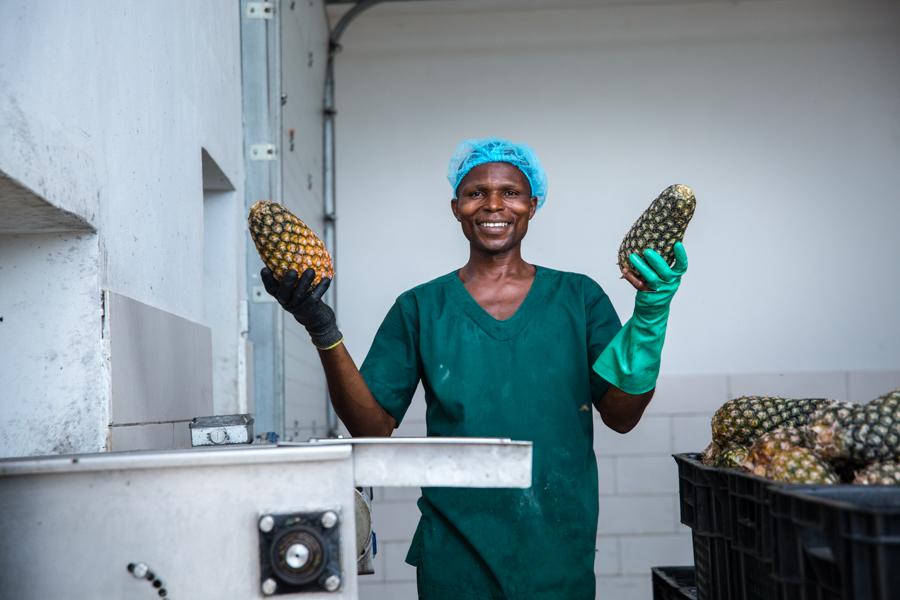
Développement de l’Entreprenariat dans la Filière Ananas (DEFIA) 88 coopératives et 35 producteurs bénéficient de la subvention de dessouchage, labou
Reece-hermine ADANWENON | 08/04/2020
Sur un total de 2674 demandes présélectionnées avec une superficie totale de 3258 ha, une sélection a été faite suivant des critères de plantations tenues par les coopératives et les femmes et la localisation du champ dans les zones non traditionnelles de production ou zones d’extension. Elle a abouti à l’attribution de 123 demandes pour une superficie de 928 ha dont 32% dans les zones d’extension de production d’ananas à savoir : Ouidah, Kpomassè, Ifangni, Adja-Ouèrè, Kétou, Aplahoué, Klouékanmey, Lalo, Athiémé, Comè, Lokossa, Adjohoun, Akpro-Missérété, Abomey, Ouinhi, Za-Kpota , etc.. Après un appel à projet lancé au niveau des producteurs d’ananas et une présélection réalisée par les Cellules communales des Agences Territoriales de Développement Agricole (ATDA) des pôles 7, 6 et 5, une phase d’attribution définitive aux bénéficiaires retenus a été organisée. Le comité d’attribution était composé des représentants de l’Agence Territoriale de Développement Agricole (ATDA) du pôle 7, de l’Association Interprofessionnelle de l’Ananas du Bénin (AIAB), de la Direction Départementale de l’Agriculture, de l’Elevage et de la pêche, et du programme DEFIA. Le programme DEFIA, à travers cette opération ambitionne de contribuer à augmenter les volumes de production d’ananas à travers l’amélioration de la productivité et l’extension des superficies. En plus de l’accompagnement financier, les producteurs seront également accompagnés sur le plan technique, de gestion et de mise en marché de leurs productions, organisés en clusters agricoles.Pour l’évaluation des demandes de subvention, les chefs cellules communales, président des comités de présélection formés L’étude des dossiers de demandes pour la présélection des producteurs actuels ou potentiels pour l’obtention des subventions pour le dessouchage, le labour, la fourniture et la plantation de rejets d’ananas de qualité obéit à des critères prédéfinis. En effet, le processus de la présélection s’est fait suivant un outil d’analyse qui résume l’ensemble des critères ainsi que les principales étapes à franchir par chaque producteur candidat à la subvention. Au cours de l’atelier de formation qui s’est tenu le 08 janvier 2020 à Allada, Salami TENAKAH, responsable de l’intervention 1 de DEFIA et Aristophane APLOGAN, Assistant Technique National Recherche et Innovation de Production, ont passé au peigne fin, les différents points de l’outil d’analyse que les membres des comités communaux de présélection doivent comprendre afin de mieux aborder l’étude des demandes de subvention des producteurs. Après l‘étape d’analyse des fiches de demande, les membres des comités ont procédé à la visite de terrain dans les champs des producteurs à présélectionner pour l’obtention des subventions demandées.
-
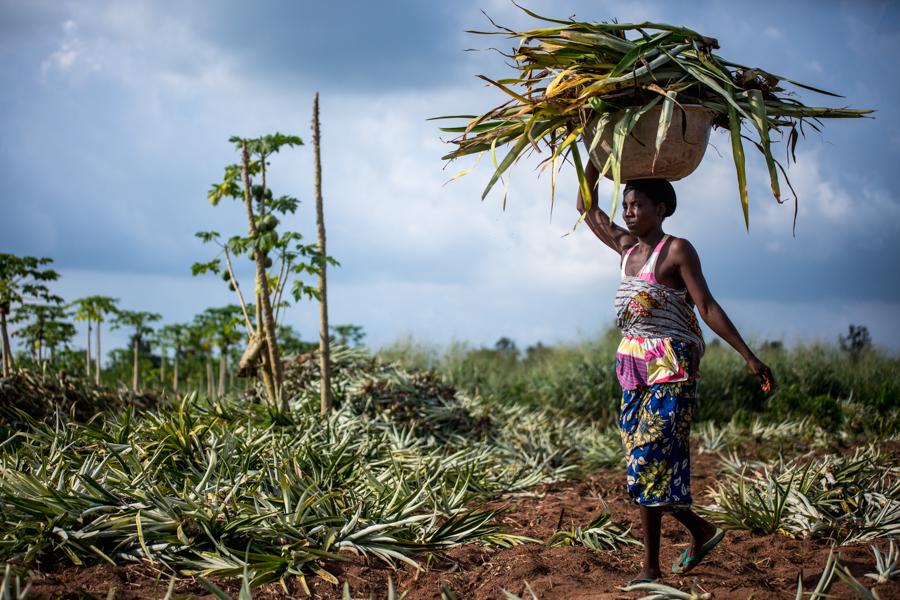
Impact de l’intervention de DEFIA sur le Genre : L’université de Namur s’intéresse aux femmes productrices
Reece-hermine ADANWENON | 08/04/2020
Evaluer le niveau d’implication des femmes productrices d’ananas dans le processus d’appel à candidatures des producteurs pour l’obtention des subventions pour le dessouchage, le labour et l’accès aux rejets. Tel est l’objectif principal de la rencontre d’une délégation de l’université de Namur en Belgique avec les responsables du programme de Développement de l’Entreprenariat dans la Filière Ananas (DEFIA), le lundi 20 janvier 2020. Pour évaluer l’impact des actions de DEFIA sur la prise en compte du Genre, l’université de Namur s’est concentrée sur trois volets à savoir : la subvention au dessouchage, l’intervention ciblée « femmes » et l’intervention « champs écoles ». L’évaluation du volet subvention au dessouchage se fonde sur la technique de randomisation par laquelle des groupes de contrôle et de traitement seront choisis aléatoirement dans la catégorie des producteurs ayant les scores intermédiaires. Concernant l’intervention ciblée « femmes », il s’agira d’évaluer l’impact qu’auront les formations techniques spécifiques aux femmes, les formations à l’inclusion financière, etc. sur les femmes productrices d’ananas. Pour le volet 3, il s’agira d’évaluer l’impact de l’intervention « champs écoles » dont l’objectif est d’encourager les femmes à adopter de nouvelles techniques culturales. La collaboration entre Namur et DEFIA a démarré par le volet « subvention au dessouchage » qui était au cœur des échanges lors de la rencontre. Divers sujets dont l’organisation de la présélection, l’attribution de la subvention aux bénéficiaires, la composition des groupes de femmes, etc. ont été débattus. Soulignons au passage que le programme DEFIA dispose d’un volet transversale « Genre » visant à faciliter l’implication des femmes et des jeunes dans les chaînes de valeurs d’ananas à travers la levée des contraintes spécifiques auxquelles font face ces acteurs.
-

Pour stopper la propagation du Coronavirus, Enabel accompagne le Ministère de la Santé du Bénin
Reece-hermine ADANWENON | 08/04/2020
Allô : 51 02 00 00 et 51 04 00 00 ! Ce sont les numéros gratuits que vous pouvez désormais appeler pour avoir la réponse à vos diverses préoccupations et inquiétudes sur le #Coronavirus ; recueillir des d’informations et des conseils afin de vous protéger et de protéger les autres du Coronavirus et signaler des cas suspects… Depuis le lundi 23 mars 2020, un call center est donc érigé au sein du ministère de la santé et assure un volume de 150 appels journaliers environ avec pour la majorité une recherche d’informations sur les signes de la maladie et comment se protéger mais aussi des cas de dénonciation et d’alerte. Ce Call Center dispose d’un système développé pour prendre plusieurs appels simultanés : 4 à 10 puis 30 dans les jours à venir. Les appelants sont accueillis avec des messages de prévention automatique en plusieurs langues internationales (français, anglais) et nationales (fon, yoruba, bariba, dendi). Le centre est animé 24/24 par des téléopérateurs mis en place par le Ministère de la santé avec une gestion spécialisée des appels nécessitant une prise en charge immédiate. Ce centre d’informations s’intègre dans un projet initial du Ministère de la Santé, le projet « je t’écoute » appuyé par Enabel et Affaires Mondiales Canada et destiné à la gestion des plaintes des usagers des services de santé.
-
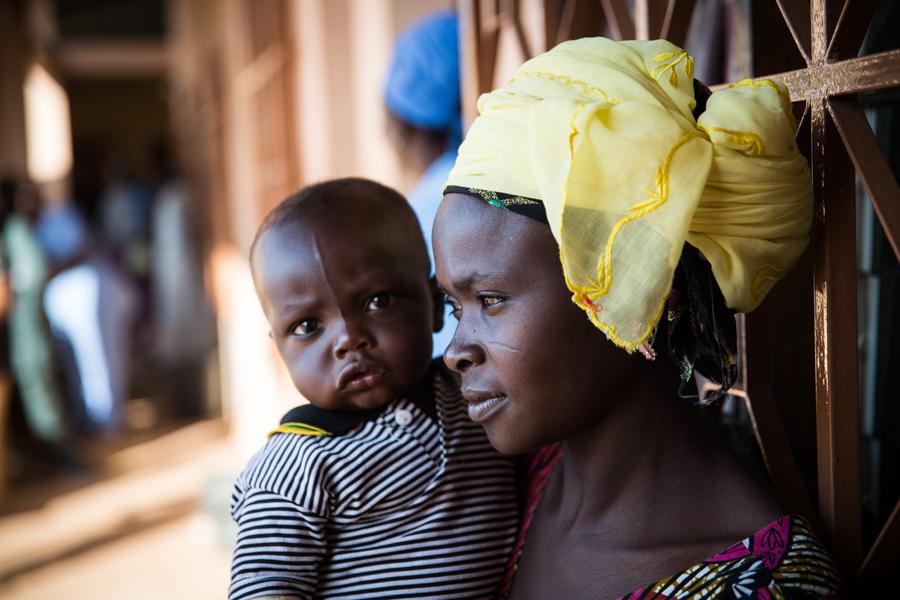
EQUITE : Ensemble pour une Qualité des soins Inclusive et Transparente, orientée vers l’Egalité genre
Reece-hermine ADANWENON | 08/04/2020
L’Agence Française de développement (AFD) en concertation avec l’Etat béninois a décidé de confier la mise en œuvre du Projet «EQUITE» à Enabel, présente au Bénin dans le secteur de la santé depuis 20 ans. D’un montant de onze (11) Millions d’Euros, cette intervention se focalise sur les Maladies Non-Transmissibles (MNT), les Soins Obstétricaux et Néonataux d’Urgence (SONU), le genre, le renforcement des Ressources Humaines en Santé (et les institutions de formation) et le développement du système de santé local au niveau des Zones Sanitaires (ZS) et Directions Départementales de la Santé (DDS) appuyées. L’intervention proposée comprend un objectif transversal de réduction des inégalités femmes/hommes, qui se traduit par la mise en place d’activités spécifiques dans chaque sous-composante de l’intervention:Composante 1 : Rendre disponibles des services de santé promotionnels, préventifs et curatifs de qualité SONU et MNT, en tenant compte des besoins spécifiques des femmes, des adolescent(e)s et des enfants dans les Collines et au niveau du pôle pédiatrie du CHD du Borgou avec une meilleure redevabilité envers les patients. Composante 2 : Renforcer les capacités du personnel soignant disponible et mieux former en tenant compte des enjeux de genre dans les formations sanitaires. Composante 3 : Renforcer les capacités techniques et la gouvernance des institutions partenaires du projet, dans le respect de l’égalité femmes/hommes des structures ciblées par le projet. Ambitions du Projet : « EQUITE »L’objectif général est de contribuer à l’amélioration de la santé des populations du Bénin en particulier les plus vulnérables, en visant l’égalité femmes/hommes. L’objectif spécifique vise à ce que la population du Bénin dispose d’une offre de soins intégrée de qualité pour les Soins Obstétricaux & Néonatals d’Urgence (SONU) et les Maladies Non Transmissibles (MNT), en tenant compte des besoins spécifiques liés au genre, principalement dans le département des Collines et au niveau du pôle pédiatrie du Centre Hospitalier Départemental du Borgou. Zones d’intervention - Le département des Collines qui comprend trois zones sanitaires (ZS) : Les Zones Sanitaires Dassa-Glazoué (DAGLA), Savé-Ouèssè (SAO), Savalou-Bantè (SABA). - Le service de pédiatrie du Centre Hospitalier Départemental (CHD) du Borgou - Les institutions de formation (IFSIO à Parakou, INMES à Cotonou).Résultats attendus de la Composante 1 · Amélioration du Plateau Technique avec acquisition et maintenance des équipements biomédicaux ; · Mise en place de la démarche qualité dans l’ensemble des formations sanitaires appuyées ciblant les services SONU et MNT comme ‘services traceurs’ ; · Renforcement de la disponibilité des produits sanguins labiles au niveau des formations sanitaires ; · Amélioration de l’offre intégrée des services promotionnels, préventifs et curatifs des MNT ; Mise en place d’un dispositif de redevabilité patient (Plateformes des Utilisateurs des Services de Santé (PUSS) et un appui à la structuration de la demande au sein des zones sanitaires (ZS). Résultats attendus de la Composante 2 · Deux instituts de formation d’infirmiers et de sages-femmes du pays, l’Institut National Médico-sanitaire (INMeS) situé à Cotonou et l’Institut de Formation en Soins Infirmiers et Obstétricaux (IFSIO) situé à Parakou sont ciblés par cette intervention. De nouvelles formations de qualité seront créées dans ces deux institutions pour pallier l’insuffisance du personnel soignant au Bénin dans certaines spécialités. Des bourses pour les étudiants seront accessibles de façon équitable (femmes/hommes) afin de lever l’obstacle financier rencontré précédemment pour l’accès à des masters ; · Une politique de stabilisation des ressources humaines formées est développée afin de limiter le turnover du personnel ou réduire son impact en remplaçant du personnel formé. Dans cette politique de stabilisation, le projet travaillera avec les acteurs des SYLOS (Systèmes locaux de santé) à améliorer les conditions de vie et de travail pour le personnel travaillant des zones rurales enclavées. Résultats attendus de la Composante 3 · Les capacités du Ministère de la Santé (MS, de la DDS et des ZS des Collines), de l’IFSIO et de l’INMeS sont renforcées pour appuyer : o i) la mise en œuvre de la stratégie genre au niveau départemental ; o ii) l’intégration du thème de l’environnement/lutte contre le changement climatique dans toutes les stratégies sectorielles ; o iii) l’opérationnalisation des stratégies MNT & SONU au niveau départemental ; o iv) la gestion rationnelle des équipements et infrastructures. o Au niveau local, un audit organisationnel et de capacités incluant un plan d’actions et des indicateurs de suivi est réalisé en début de projet au niveau de la DDS et des ZS afin d’améliorer leur performance pour le pilotage et la gestion du système local de santé.
-
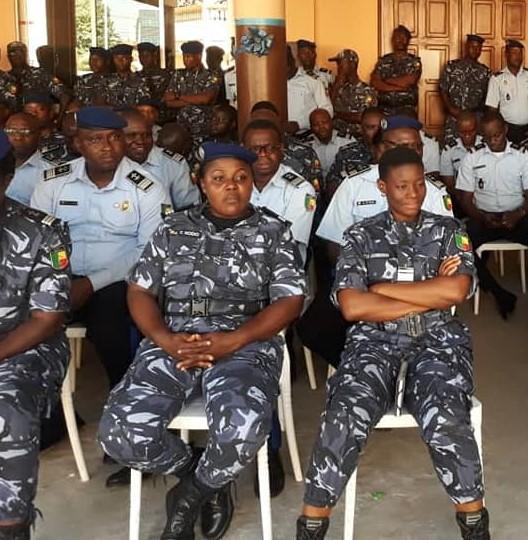
Appui à l’opérationnalisation de la Police Républicaine
Reece-hermine ADANWENON | 08/04/2020
La Police Nationale et la Gendarmerie, deux corps d'armée initialement distincts en République du Bénin avaient fusionné en décembre 2017 pour donner naissance à une Police républicaine en application de la Loi N°2017-41 du 28/12/17 portant création de la Police Républicaine. Cette réforme, qui s’inscrit dans une dynamique globale nationale de lutte contre la corruption, de la recherche d’efficience pour une orientation « client » est l'occasion du lancement de grands chantiers tels que la digitalisation, la revue du cadre organique de la nouvelle organisation et l'amélioration de la couverture nationale. La Belgique ayant opéré cette fusion, a décidé de s’investir de manière significative aux côtés des acteurs de la sécurité nationale béninoise, afin d’appuyer l’opérationnalisation de cette nouvelle institution.Ambitions du programme PAOPL’ambition est de définir et de compléter le cadre organique et la couverture territoriale de la Police Républicaine ; d’améliorer le contrôle qualité des différents processus et d’élargir le soutien à la Police Républicaine. L’objectif général est de promouvoir l’avènement d'une société pacifique et ouverte à tous aux fins d'un développement durable, d’assurer l’accès de tous à la justice et de mettre en place, à tous les niveaux, des institutions efficaces, responsables et ouvertes à tous. L’objectif spécifique est d’appuyer l’opérationnalisation de la Police Républicaine.Résultats attendus de l’interventionLe concept de Police communautaire est développé et mis en œuvre. Ce premier résultat ne pourra être atteint qu’à travers plusieurs actions concernant (i) l’amélioration de la couverture territoriale des Commissariats d’arrondissement, (ii) le renforcement des capacités de projection des policiers dans leur territoire (iii) le renforcement des mécanismes d’appui, de suivi et de contrôle des commissariats d’arrondissement (iv) le développement et la mise en œuvre du concept de Police Communautaire, (v) amélioration des fonctions de base des commissariats d’arrondissement.Les phénomènes prioritaires locaux liés à la délinquance informatique sont mieux gérés. Il s’agira pour atteindre ce deuxième résultat de : (i) définir le rôle et le cahier des charges des différents services, (ii) renforcer les capacités en matière d’analyse criminelle et de planification stratégique, (iii) d’appuyer à la mise en œuvre du plan de lutte contre la cybercriminalité, la création de partenariats et de développement de réseau (iv), et l’appui à l’accueil et l’accompagnement des victimes.La Gestion des Ressources Humaines, et de son axe formation, sont renforcés. Ce troisième résultat sera atteint grâce à un (i) appui à la gestion et à la planification du personnel de la Police Républicaine, (ii) la prise en compte du genre dans le recrutement et la gestion du personnel, (iii) la finalisation des formations statutaires et à la constitution du répertoire des formateurs, (iv) l’amélioration des processus de Gestion des Ressources Humaines avec le développement de la formation continue, (v) le recueil et la prise en compte des besoins des policiers, (vi) la création de partenariats externes et mise en réseau des structures de formations.
-
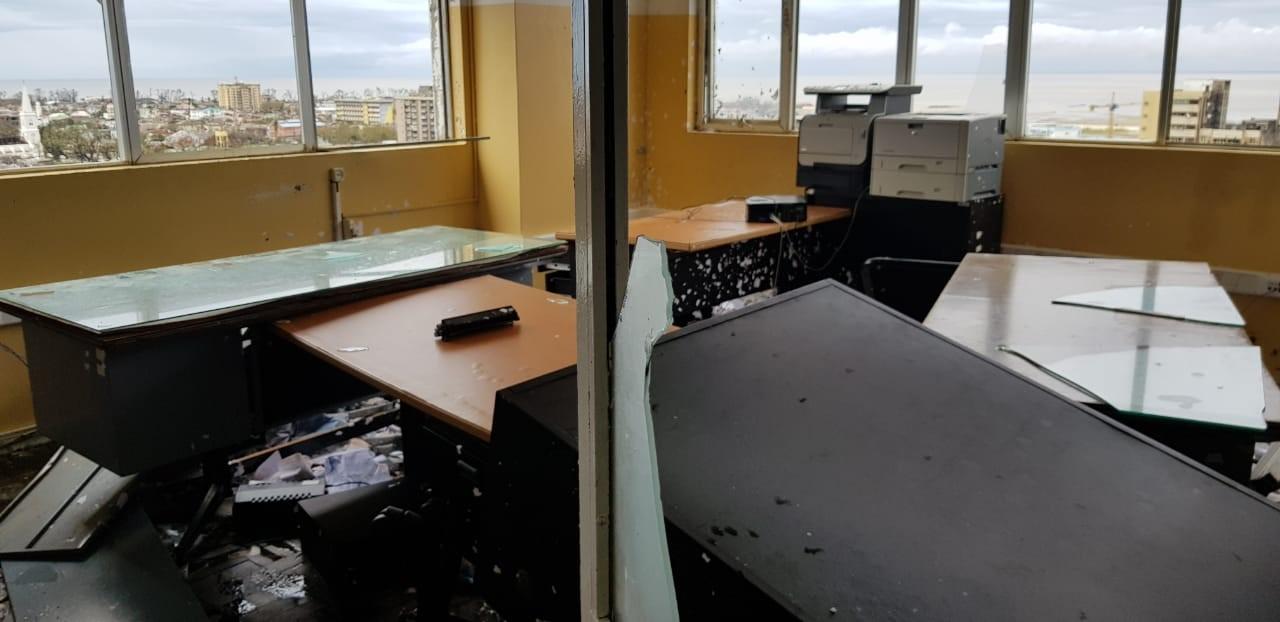
Mozambique: A year later: slowly recovering from Idai cyclone, but shielding from Covid-19
Akila MUNIR | 06/04/2020
By Evert WAETERLOOS, Enabel MaputoOn March 15th last year, a major humanitarian crisis hit Mozambique. Cyclone Idai brought heavy rains and floods to the provinces of Tete, Manica, Niassa, Zambezia and Sofala, and destroyed most of the city of Beira (see Van de Velde, A. and E.Waeterloos ‘Climate and energy crises in Mozambique: time to refuel the debate?’ on open.enabel.be April 2019). Mozambique and Belgium have ongoing collaboration projects in capacity building for sustainable access to energy, with an emphasis on renewable and decentralised energy for rural areas in the provinces of Zambezia, Manica and Sofala. Partners are the Ministry of Mineral Resources and Energy (MIREME), selected Provincial Directorates of Mineral Resources and Energy (DIPREME), the new National Energy Regulatory Authority ARENE, and the Energy Fund FUNAE. Idai caused significant damage to the DIPREME offices in the cities of Beira (Sofala) and Chimoio (Manica); windows and roofs were blown away causing considerable water damage to the IT Equipment. To support MIREME at national and provincial level in its reporting and planning tasks, Enabel responded positively to the request to replace the necessary equipment in both provincial DIPREME offices, and to improve the internet connectivity between the central and provincial offices. This support was also deemed urgent, as it provides the basic infrastructure for the presently ongoing financing of an integrated country-wide IT platform for energy data management in MIREME. In collaboration with the IT technicians of MIREME, appropriate equipment and services were identified, assessed and sourced through public procurement. All IT material was eventually sourced through local suppliers. These face sometimes challenges with stock and foreign exchange management, as well as security risks with transport, as threats of armed attacks along the main highway linking Maputo with the central provinces resurface regularly. In addition, setting up all systems locally proved to be a challenge as well. Building repairs in the provincial offices took place at the same time, as the necessary budget allocations from central government were delayed. And as local DIPREME internet capacity failed for the installation of software downloads, a solution was found in temporarily borrowing the project modem from Enabel. However, in the end and unfortunately later than planned, all equipment was delivered and installed as designed by the partner’s technical team, and are now able to run promising IT applications for improved communication and reporting in the near future. With the promised aid for recovery from last year’s Idai disaster trickling in only very slowly from different corners, Mozambique is facing a new disaster. Because of the Covid-19 pandemic, a state of emergency of 30 days has been declared as from April 1st. The state of emergency intends to restrict movements to reduce transmission of the disease, which at present stands at 10 officially confirmed cases out of around 360 tested. While this is not yet a full lockdown, there is an intense debate of the possible impact on livelihoods of a total lockdown such as the one in neighbouring South Africa with 1655 confirmed cases and 11 deaths. With the degree of poverty and informal or low-grade urbanisation prevailing in Mozambique, most people live from day-to-day without money or food reserves, in self-built houses, in close vicinity of each other, and without access to proper water and sanitation. This renders the idea of a preventive forced isolation unfeasible. Unless it is accompanied by extraordinary compensatory public services and costly crisis measures. However, the alternative of the same poor households having to cope with an exponential growth in sick and dying people because of a weak health system - with an officially reported 22,000 test kits available only - is equally undesirable. The delayed release of the Government of Mozambique’s new 5-year plan 2020-2024 has allowed a last-minute inclusion of additional management and resilience promotion activities in view of the increased risk of natural and man-made disasters. At a meeting with donors last week, government asked for US$703 million to fight Covid-19. However, part of it is requested as budget support and the majority of the resources are earmarked for the construction of district hospitals promised during last year’s election campaign. The resumption of budget support is not likely since donors stopped it in 2016 when secret public debts to the tune of US$2 billion were revealed. Hence, additional or ahead of schedule-financing of the common fund for the health sector PROSAUDE - of which Enabel manages technical assistance in Public Finance Management financed by Flanders - is a valid alternative being considered. Meanwhile, the promotion of emergency measures in the formal public and work places is necessary to reduce the risk of a rapid spread of the pandemic. However, it is clear that in the case of disasters such as these, Mozambique’s poor populace is again caught between a rock and a hard place. Their precarious livelihoods do unfortunately not leave much room for increased risk aversion practices. These are reminders that development cooperation needs to address both emergency situations as well as the structural causes of inequality in the face of such emergencies.
-
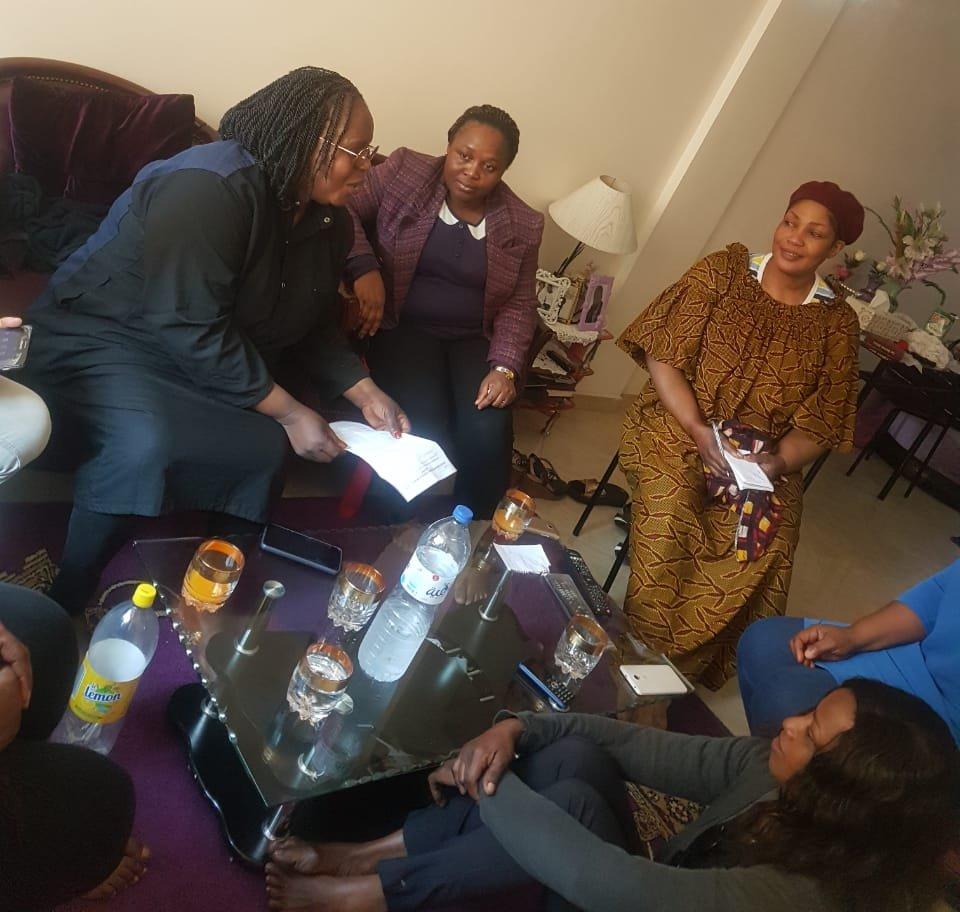
Le projet Amuddu contribue à l’économie sociale et solidaire territoriale en promouvant le rôle des femmes migrantes entrepreneuses
Clara HUYGHE | 02/04/2020
6 coopératives de personnes migrantes à Casablanca ont été accomapgnées dans le cadre de la mise en œuvre du projet Amuddu de concert avec ses partenaires, l’Agence nationale de promotion de l'emploi et des compétences (ANAPEC) et l’appui de l’Office du Développement de la Coopération (ODCO), à travers l’accompagnement et la mobilisation communautaire de proximité déployée par ses 4 agent.e.s communautaires.En effet, grâce à l’accompagnement et la mobilisation communautaire assurés par les agent.e.s communautaires, équipes opérationnelles et de proximité du projet Amuddu, ainsi que des partenaires institutionnels de référence sur ce domaine -l’ANAPEC et l’ODCO-, six coopératives sont accomapgnées à Casablanca, couvrant les secteurs des services, notamment la restauration et l’artisanat. Il s’agit des coopératives : Grillade Party (5 membres du Gabon, Cameroun et Congo) Food Ivoire (5 membres de Côte d’Ivoire) Chez Maman Nathou (5 membres de Côte d’Ivoire) Ezer Coiffure (5 membres de Côte d’Ivoire) AB (5 membres du Congo) AKWABA (5 membre de Côte d'Ivoire et Sénégal)Accompagnées par des collaborateurs Enabel, agents communautaires du projet Amuddu, ces premières coopératives de service ont vu le jour entre février et mars 2020. C’est au travers d’ateliers de création de coopératives, organisés en partenariat avec l’ANAPEC et l’ODCO, que les coopérant.e.s ont été informé.e.s sur les modalités et procédures à suivre puis accompagné.e.s jusqu’à la création juridique et administrative de ces entités. Désormais, ces groupements économiques seront intégrés dans le processus d’accompagnement prévu dans le cadre de l’intervention Amuddu, visant des actions de renforcement de capacités allant de formations en gestion jusqu’aux ateliers dédiés aux techniques de commercialisation et en passant par d’autres thématiques telles que le réseautage et le marketing.
-

Formation de formateurs en genre et développement des organisations de la société civile de la région de Koulikoro
Nènè TRAORE | 01/04/2020
La ville de Fana a abrité pendant dix jours deux séances de formations des formateurs en genre et développement à l’intention de vingt personnes des organisations de la société civile de Koulikoro. Facilitée par l’ONG Internationale « Le Monde selon les femmes », cette formation visait à renforcer les compétences du personnel de différentes organisations afin de constituer un vivier de ressources humaines compétentes en genre et développement. Elle envisageait par ailleurs de contribuer à l’amélioration de la prise en compte de la problématique genre dans les projets et programmes de développement dans la région de Koulikoro.Découvrons d’avantage les thématiques abordées dans la vidéo.
-
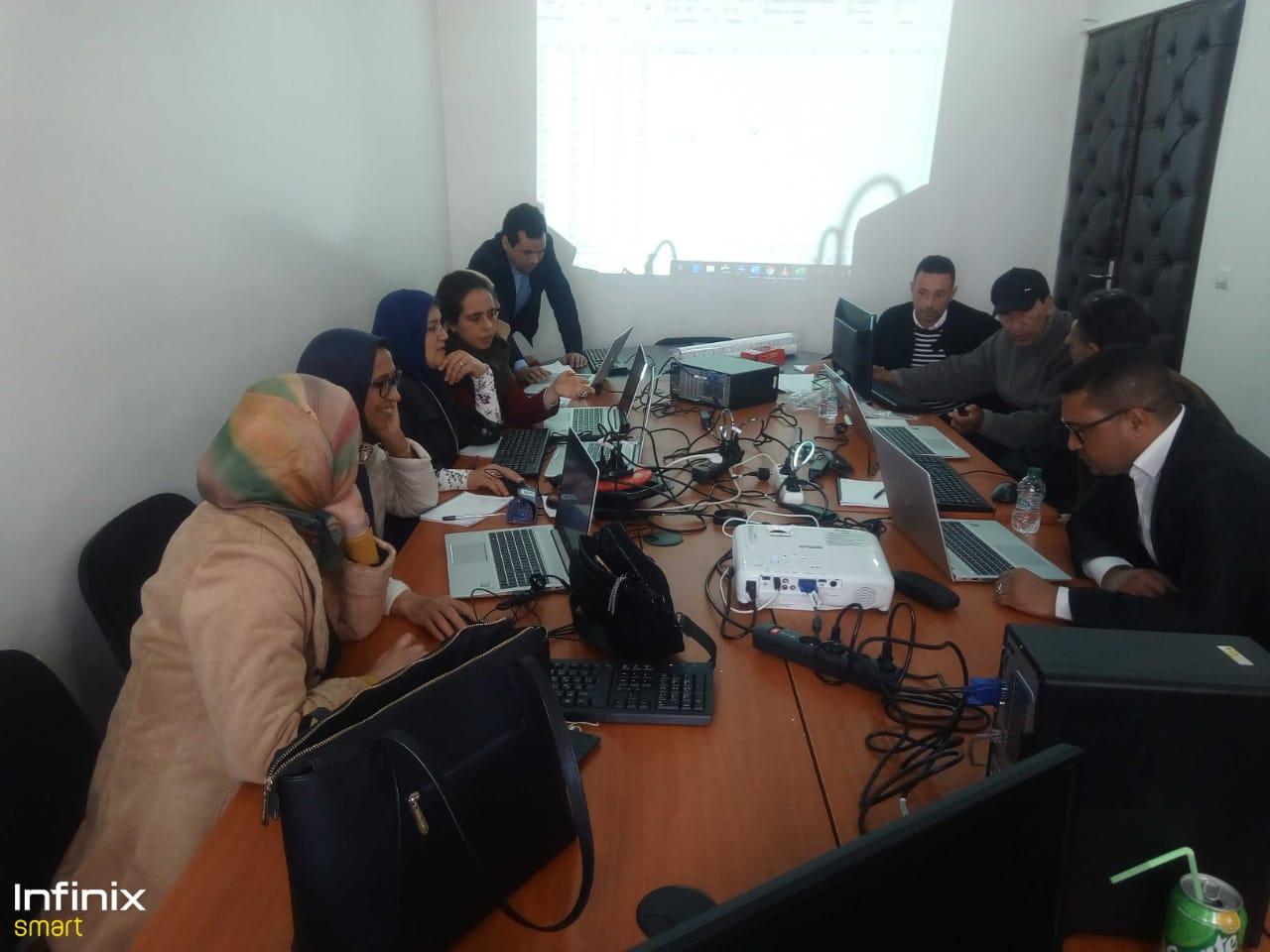
Le personnel de l’Entraide Nationale -service social publique- améliore ses compétences digitales
Clara HUYGHE | 27/03/2020
Les capacités des ressources humaines des centres de formation relevant de l’Entraide Nationale (EN) à Rabat ont été renforcées en matière de digitalisation (gestion informatique). Cela permettra, entre autres, d’améliorer la remontée de l’information sur le nombre de personnes migrantes bénéficiant des services de l’Entraide Nationale à Rabat et de favoriser l’utilisation de contenus multimédia lors des cours de formation professionnelle offerts par cette institution.Organisée dans le cadre du projet Amuddu, cette action de formation a permis de former 12 personnes, parmi elles 5 femmes et d’améliorer la mise à niveau informatique des ressources humaines des centres de formation par apprentissage de l’Entraide nationale. Ensemble avec les apprentis marocains, cette institution accueille également des personnes migrantes souhaitant apprendre un métier de manière pratique.La formation informatique dispensée contribuera ainsi à favoriser un meilleur suivi, rapportage et remontée de données statistiques au niveau central sur le nombre d’apprentis et leurs profils, ainsi qu’une meilleure utilisation de l’outil digital dans l’animation des cours de formation professionnelle au profit des bénéficiaires, y inclus les personnes migrantes.À l’issue de cette formation action, Madame Ghizlane Messrour, directrice du centre de formation par apprentissage (CFA) de l’Akkari à Rabat souligne que ; « l’appui d’Enabel est très important, grâce à ce matériel et à la formation, nous allons pouvoir améliorer nos services aux apprentis y compris les migrants ». Cette action de formation a été complétée également par la dotation d’équipement informatique pour plusieurs centres de formation à Rabat, Salé, Mohammedia et à Casablanca.En outre, cette initiative s’inscrit dans un processus plus large visant le renforcement de capacités inhérent à l’amélioration du système de monitoring de l’EN, notamment en ce qui concerne la dimension migratoire. Dans ce cadre, une sensibilisation des points focaux « migration » au niveau des coordinations de l’institution à Rabat et Casablanca a été réalisée précédemment afin d’améliorer le travail de suivi de l’Entraide nationale en ce qui concerne la Stratégie nationale d’immigration et d’asile.
